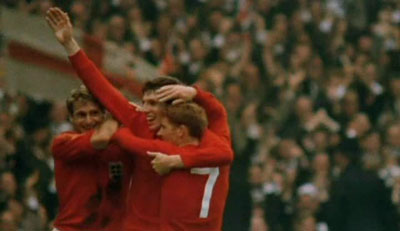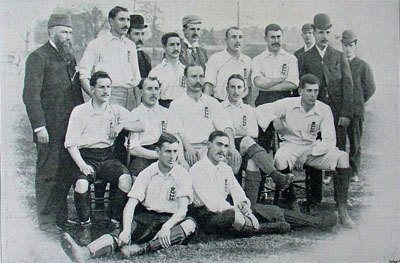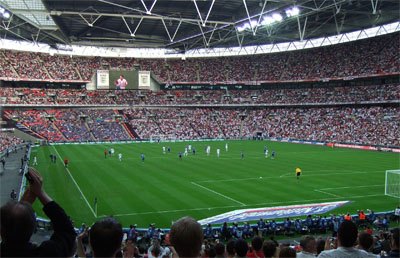England
England national association football team has a special place in the history of football, being from the British island in which the game was invented in many aspects. The team were involved in the first football matches ever between countries.
Main trophies
World Cup: 1
Player records
Most games played: Peter Shilton (125)
Top goalscorer: Wayne Rooney (53)
Stats

Moments of glory for the English football team.
History
Early history – one of the first national teams
The national team of England was formed at the same time as Scotland's, and that makes it one of the two oldest national football team. They played their first matches against each other already in 1870 and are therefore absorbed in the early modern history of the game. The very first game between the two nations was played on March 5, 1870, and the ground was The Oval in London. Quite symbolic, the match ended with a draw, 1-1.
Before the rest of the world had incorporated football, England together with the other British nations contested each other in the annual British Home Championship. After being runners-up to Scotland in the four first editions, England would win the tournament for the first time in 1888. The British Home Championship would exist for a hundred years and England would be the most successful team with 54 wins (some years the win was shared with other teams with the same points, goal difference did not count).

England national team in 1893 at Richmond.
England would be successful in the football tournaments that was played in the Olympic Games in the beginning of the century. At the 1900 London Summer Olympics, football was included for the first time. and the British national teams were represented as Great Britain. They won the tournament, but only two other nations – France and Belgium – would partake.
After being absent in the 1904 Summer Olympics, Great Britain would again win the gold medal in the 1908 Summer Olympics. Only five nations did partake. They would continue their domination in the Olympic football tournaments until 1920, when Norway would defeat the British team – which had only amateur players on the field – in the first round.
The loss to a national team which included professional players would start a dispute between FA and FIFA. FA wanted to keep professionals outside the Olympic football tournament, whereas FIFA had other plans. As an effect, Great Britain would withdraw from the next two Olympic football tournaments.
The Great Britain national team would return to the Olympics in the 1936, where they were eliminated in the second round against Poland. But the invention of the World Cup had changed the map: the Olympic football tournament would no longer be the foremost settlement of which the best national team were competing.
England's World Cup history – one great success and a streak of failures
England did join FIFA in 1906, but as the inventor of the sport, England didn’t see any clear reason to subordination and in 1928 they left the organization. It meant that England wouldn't take part in the first World Cup, which was arranged in Uruguay in 1930.
England would not participate in the World Cup until 1950 after rejoining FIFA in 1946. England, as the inventor of the sport and once the superior force, would finally compete in the most prestigious international tournament. The outcome would be a great fiasco. England won their first match against Chile, but would when lose against United States and Spain. They were out already in the group phase and the defeat against United States was perhaps the biggest humiliation.
Three years later, another chock would hit English football. England had up to this time been defeated only once on home ground (to Republic of Ireland in 1949). Now, they would face a hard contender, Hungary that was reigning Olympic champions and undefeated the last three years. The match was labeled the Match of the Century and would be played at Wembley (the stadium had opened in the spring of 1923, at that time called Empire Stadium, and would become the first national stadium in the country). The duel would not be that epic, however, England would be clearly outperformed, losing 3 to 6.
In the following World Cup, England would be eliminated in the quarter-finals by Uruguay. Uruguay would after losing their semi-final also losing the bronze to Austria.
After a mediocre performance four years later when the tournament was held in Sweden, England didn’t manage to advance from the group phase. And in the 1962 edition of World Cup, England's advancement was stopped in the quarter-finals by a brilliant Brazil.
England had as best reach the quarter-finals in World Cup, but it would be a completely different story when they played on home ground in 1966. The home advantage would be one of the factors that lead to the historical victory.
In the first match against Uruguay, which was goalless, England’s teams didn’t look as the champions. But after that draw they would win their remaining matches. After eliminating Argentina and Portugal, they would clash against West Germany in a classic and dramatic final. After the match had gone to extra time, England could win the match with 4 against 2. Players like Geoff Hurst, Bobby Charlton and Gordon Banks has ever since remained in the finest heritage of English national football.
The win in 1966, would however, not mark the beginning of a golden era for the English national team. Four years later, in Mexico, England would advance from their group after winning two out of three, but when be eliminated in the quarter-finals by the coming runners-up in the tournament, Italy.
When the World Cup returned to Europe and West Germany four years later England would not be in it. In the last match on home ground against Poland, England could have fixed the ticket to the coming World Cup, but they only managed to draw. It was the first time the England team had failed to qualify for a World Cup.
England would miss out the next World Cup as well. This time after being rather unlucky in the qualification: Italy would take the place by goal difference (England was defeated in Rome, but would win in London in the two matches versus the Italians. The rest was a competition of making as many goals as possible against Finland and Luxembourg – Italy did three more).
England would be luckier in the next World Cup qualification and also started promising with three consecutive victories in the first group phase in the final tournament. This particular World Cup had a new setup with a second group phase. Against the opponents West Germany and Spain no goals was scored by either teams. West Germany would, however, beat Spain in the third game and advance to the semi-finals. England was out, even that they hadn’t lost a single match.
Many of us have clear memories what happened in World Cup 1986 on account of the English team. The match versus Argentina in the quarter-finals is still hard to forget: it included one of the most controversial goals in the history and one of the most brilliant. The first was “the hand of God”, which the referee missed, and the second was the same man’s dribbling from the other half field and all the way trough England’s goalkeeper Peter Shilton.
The 1990 World Cup in Italy could have been England’s second great triumph in international football. It would, however, end in tears. Neither before nor after 1966 had England advance trough the quarter-finals. In 1990, they did, by beating the surprise team of the tournament, Cameroon. The Cameroon game was dramatic, and the next against West Germany brought even more drama. Unfortunately for England, the match was decided on a penalty shootout, one area of the game in which the English national team have shown to be inferior. Instead of the final, England would play, and lose, the Third place match against Italy.
England would miss the qualification for the 1994 World Cup, but in the next edition of the tournament held in France they would be back in the heat after a great performance in UEFA European Championship. Everything seemed not in perfect order though. Paul Gascoigne, the hero from World Cup 1990 and Euro 1996 was out due to overweight. Tim Sheringham, another star in the squad, was criticized after being seen on a nightclub during the tournament. Two younger players would instead redeem England’s fans: The first, Michael Owen, was only a substitute the first two matches. He got only five minutes in the first match and nine in the second, which was enough to do England’s only goal against Romania. In the third group match he started. But it was in the quarter-final against Argentina that he really presented himself as a wonder boy after a solo raid resulting in 1-0 and after that being a dangerous threat to the opponents.
The second young player was David Beckham. He scored on a free kick against Colombia in the last group match. But in the end, he would become the scapegoat after a rash reaction against Diego Simeone in the round of 16, which reduced England to ten men for the most of the game. It would be the last act for England, after another pitiful penalty shootout.
In 2002, when the tournament was held in Asia for the first time, England arrived as usual with high expectations. The team advanced from the group, when won in impressive style over Denmark in the first playoff round, but was unlucky to face Brazil in the next match, which would defeat England on their way to be the champions.
The tradition for the English team was held in the next World Cup: they were once again eliminated in the quarter-finals, and once again after losing a penalty shoot-out. In the following World Cup, in South Africa, England was eliminated in the first playoff round, outperformed by Germany which won 4 to 1.
England was placed in Group D together with Costa Rica, Italy and Uruguay in the 2014 World Cup. They managed only to collect one point, in the match against Costa Rica and got an early trip back to Great Britain.
Many have speculated about the reasons that a great traditional football nation as England haven’t won the FIFA World Cup or the UEFA European Championship since 1966 (it should be noticed that England decline the invitation to participate in the three first editions of the World Cup and the first edition of UEFA European Championship).
In the book Soccernomics, the writers Simon Kuper and Stefan Szymanski claim that the most heard arguments – including that England perform bad due too many foreign players in their own league – are wrong. According to their calculations, there are 32 % English players in the Premier league, and that is more domestic players than in many other of the big European leagues. They focus on two primary reasons why England doesn’t succeed very well in the big tournaments. The first is that there are too few English players in the other big Europeans leagues except Premier League. The second is that there are too many matches in English club football making the players tired when the time come for international tournaments. Another interesting aspect from the analyze that supports the second point is the fact that England has seldom scored in the second half in World Cup (only six of the team's forty-three goals have come in the second half in their seven big tournaments played after 1998). Simon Kuper and Stefan Szymanski asserts that the players have been worn out.
The England national team has had mostly English coaches, except two non-British: Sven Goran Eriksson and Fabio Capello. As the writers of Soccernomics concludes, the statistic shows that a higher frequency of winning games plus of qualifications for tournaments was made when a foreign manager was coaching (the figures are base on the period 1990-2011).
England in European Championship
England have never won the Euro tournament, but have been very close. In 1996, as the host nation, they reached the semi-finals. The match against Germany was standing 1-1 after full time and would continue to a penalty shoot-out, not the best discipline for the English team, and they lost.
In 2021 (in the 2020 Euro), they finally reach the final. Italy stood as opponents. Once again the result was 1-1 after full time and no goals were made during the extra time. Another penalty shoot-out was to proceed, but neither this time it would go England's way.

England playing against Estland at Wembley in 2007.
FIFA World Cup results
England has participated 15 times in the World Cup (FIFA World Cup qualification not included).
| Year | Result | Notes |
|---|---|---|
| 2022 | Quarter-finals | |
| 2018 | Semi-finals | |
| 2014 | Group Stage | |
| 2010 | Round of 16 | |
| 2006 | Quarter-finals | |
| 2002 | Quarter-finals | |
| 1998 | Round of 16 | |
| 1994 | Not qualified | |
| 1990 | 4th place | |
| 1986 | Quarter-finals | |
| 1982 | Round 2 | |
| 1978 | Not qualified | |
| 1974 | Not qualified | |
| 1970 | Quarter-finals | |
| 1966* | Winners | 1st tournament title |
| 1962 | Quarter-finals | |
| 1958 | Group Stage | |
| 1954 | Quarter-finals | |
| 1950 | Group Stage | |
| 1938 | Decline to participate | |
| 1934 | Decline to participate | |
| 1930 | Decline to participate |
* Host nation
UEFA European Championship results
England have participated eleven times in the European Championship (Euro).
| Year | Result | Notes |
|---|---|---|
| 2020 | Runners-up | |
| 2020 | Runners-up | |
| 2016 | Round of 16 | |
| 2012 | Quarter-finals | |
| 2008 | Not qualified | |
| 2004 | Quarter-finals | |
| 2000 | Group Stage | |
| 1996* | Semi-finals | |
| 1992 | Group Stage | |
| 1988 | Group Stage | |
| 1984 | Not qualified | |
| 1980 | Group Stage | |
| 1976 | Not qualified | |
| 1972 | Not qualified | |
| 1968 | 3rd place | |
| 1964 | Not qualified | |
| 1960 | Decline to participate |
* Host nation
By Oscar Anderson
Logo
 The three lions, stacked vertically, dominate the shield in the logo. The shield is the Royal Arms of England, a symbol that has existed since the Middle Ages.
The three lions, stacked vertically, dominate the shield in the logo. The shield is the Royal Arms of England, a symbol that has existed since the Middle Ages.
External links
References:
https://en.wikipedia.org/wiki/England_national_football_team
https://en.wikipedia.org/wiki/British_Home_Championship
https://en.wikipedia.org/wiki/Great_Britain_Olympic_football_team#1908%E2%80%931936
http://www.englandfootballonline.com/cmpwc/CmpWCTmHist.html
Simon Kuper and Stefan Szymanski, Soccernomics (2014)
Image source:
1. FIFA – World Cup Official Film 1966
2. Unknown
3. John The Scone